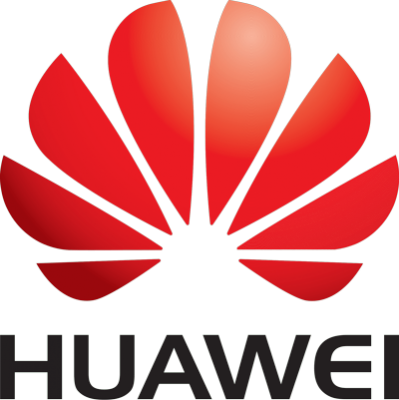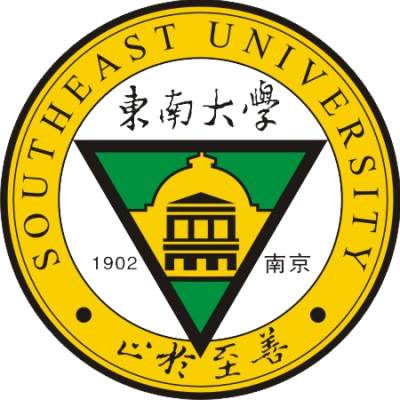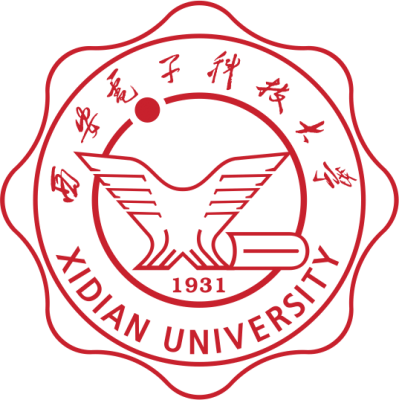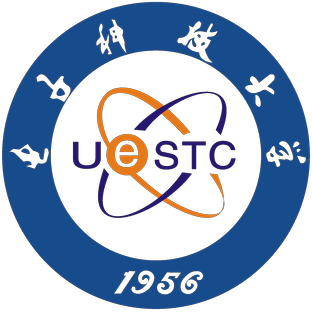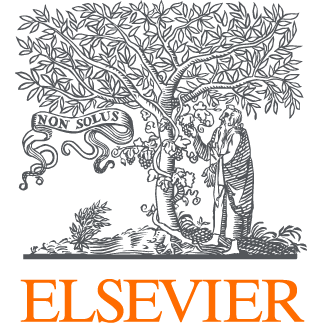IEEE ICC 2019 Industry Program consists of Industry Executive Forums (IEF), Industry Seminars (IS), Industry Panels (IP), Industry Posters (IPST), and Exhibitions.
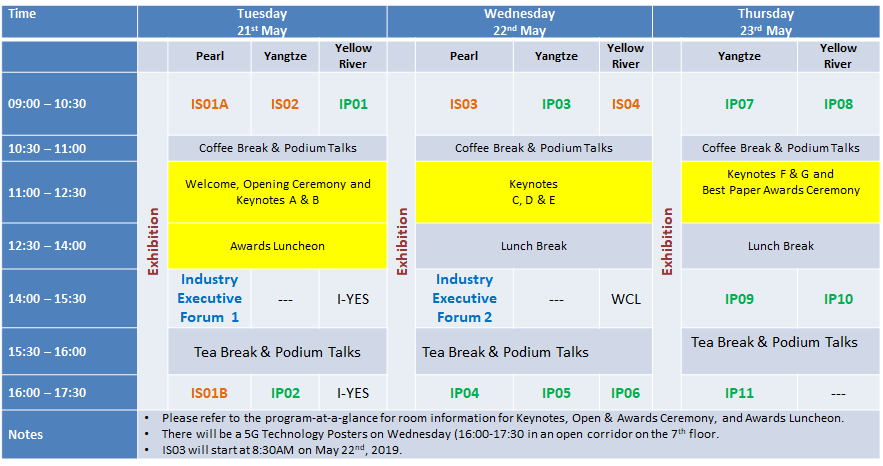
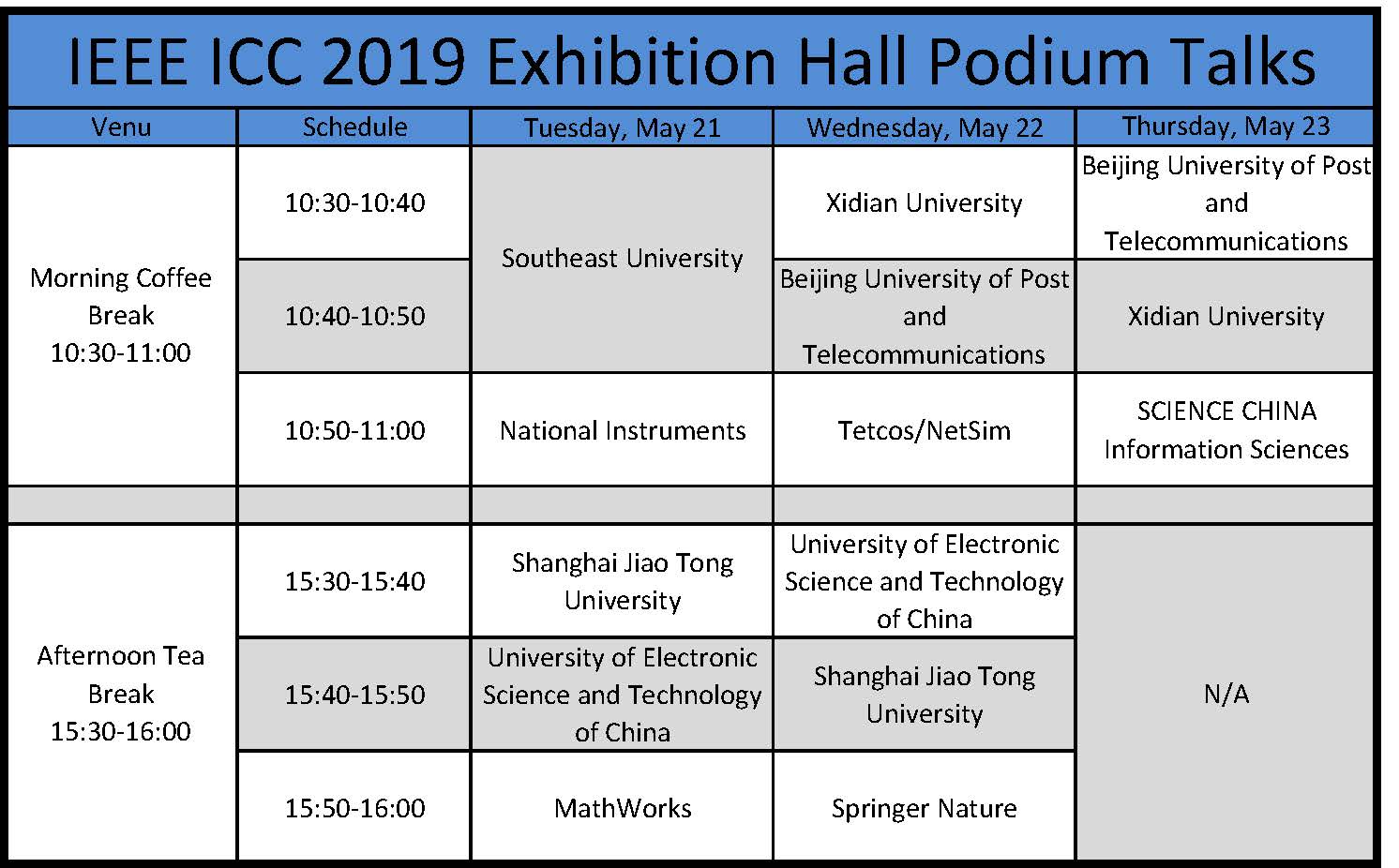
Tuesday, 21 May 2019
09:00-10:30
IP01: AI/ML in 5G PHY and Low MAC
IS01A: Blockchain Technology: Empowering Emerging Services and Applications
IS02: New IP: Design for Future Internet with New Service Capabilities Envisioned (Cancelled)
14:00-15:30
IEF01: Future Telecom - Service Providers’ Perspectives
16:00-17:30
IP02: Open the Radio Access Network: O-RAN from Concept to Reality
IS01B: Blockchain Technology: Empowering Emerging Services and Applications
Wednesday, 22 May 2019
09:00-10:30
IP03: Upscaling the IoT: 5G Device Empowering Vertical Business
IS03: 5G Deployment and Beyond
IS04: Next-Generation Wi-Fi: Extreme High Throughput and Real Time Applications
14:00-15:30
IEF02: Future Telecom – Product Suppliers’ Perspectives
16:00-17:30
IP04: 5G: The Catalyzer of the Next Internet Transformation
IP05: Beyond 5G – Moving Forward from 5G to 6G
IP06: C-V2X for Future Automated Driving and Cooperative-ITS
Thursday, 23 May 2019
09:00-10:30
IP07: The State of AI for Wireless
IP08: Directions of 5G Evolution & Beyond 5G
14:00-15:30
IP09: AI for Wireless: Current Status and the Future
IP10: 5G mm-Wave Technologies and Commercialization
16:00-17:30
IP11: Application of AI Techniques in Mobile Devices
Industry Executive Forums (IEF)
Tuesday, 21 May, 14:00-15:30
IEF01: Future Telecom - Service Providers' Perspectives
Room: Pearl Hall, 7th Floor
Organizer: Chonggang Wang, InterDigital, USA
Moderator: Edward G. Tiedemann, Jr., Qualcomm, USA
Presenters:
- David H. Lu, Vice President, SDN Platform & Systems, AT&T Labs, USA
- Dr. Qi Bi, President, Technology Innovation Center, China Telecom, China
- Dr. Chih-Lin I, Chief Scientist, Wireless Technologies, China Mobile Research Institute, China
The telecommunications industry is facing ever fast advances in technologies. In recent years, R&D on Big Data Analytics, SDN, Open Source Software, Artificial Intelligence, Machine Learning, 5G technologies, Driverless Vehicles, Quantum Computing and more, has drawn tremendous interests in the academia and industry communities. These technologies are expected to bring capabilities, like URLLC, which are not possible or not available from the existing technologies. Service providers would invest in new technologies to market new services to customers for revenue generation and/or to reduce the operational cost. In addition, investment in network and service capabilities has a business cycle related to the Return on Investment (RoI). The Panelists of this Executive Forum will discuss the business strategies and decisions on selecting the technologies to invest.
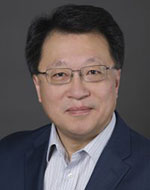 David Lu
David Lu
David Lu, Vice President, SDN Platform & Systems, is currently responsible for development and engineering of AT&T next generation ECOMP platform and open source ECOMP (ONAP) to enable AT&T network virtualization (SDN) and target OSS/BSS transformation including API, micro-services, policy control & orchestration, hyper-automation, and advanced data analytics. He leads an organization with more than 3,000 people across the globe. David is a well-respected leader in large scale, real time software architecture and development, network performance and traffic management, work flow and policy-controlled automation, large databases and big data implementation/mining/analytics, machine learning, artificial intelligence, software reliability and quality, and network operations process engineering. He has led major software platform transformation initiatives from sales to network/service delivery/assurance, and billing platforms. Examples of his achievements include large scale platforms he has led and engineered that process annually: 984 Trillion network performance events and 348 Billion alarms with 99.99%+ automation; 60 Million dispatches with 14.4 Billion automated manual steps; and over 90 Billion API transactions. Since joining AT&T Bell Labs in 1987, he has served in various leadership positions at AT&T. He has led numerous automation initiatives in AT&T that resulted in multi-billion dollar savings in the past 15 years and won AT&T the CIO 100 Award in 2010. He holds 43 patents and has frequently appeared as a guest speaker at technical and leadership seminars and conferences throughout the world. He received numerous industry awards including the 2015 Chairman’s Award from IEEE Communication Society for Network and Systems Quality and Reliability and 2017 CIE AAEOY (Asian America Engineer of Year) Award. He has also been very active in community organizations and activities including AT&T APCA, DFW-CIE, and DFW Asian American Chamber of Commerce. He was recognized by AT&T APCA with the 2015 Corporate Leadership Award.
He was accepted to the world-renowned Shanghai Conservatory of Music and came to the U.S. to complete his college education. He has an undergraduate degree in Music, majoring in cello performance and graduate degree in Computer Science.
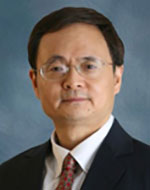 Qi Bi
Qi Bi
Dr. Qi Bi is the President of China Telecom Technology Innovation Center and the CTO of China Telecom Research Institute, managing R&D organizations with responsibilities in wireless communications. His current focus is on 5G innovations responsible for technologies, standards and trials in China Telecom. Previously, Dr. Bi had been with Bell Labs since 1988 as a member of technical staff and subsequently promoted to the distinguished member of technical staff, technical manager, senior manager or director. For his significant contributions in the second and the third generation of wireless systems, he was awarded the prestigious Bell Labs Fellow in 2002. Other awards included Bell Labs President’s Gold Awards in 2000 & 2002, the Bell Labs Innovation Team Award in 2003, and Asian American Engineer of the Year in 2005. Dr. Bi received his M.S. from Shanghai Jiao Tong University and Ph.D. from Pennsylvania State University. He is an IEEE Fellow, holds 47 US patents, 63 European patents and 48 Chinese patents. While in China Telecom, one of his 4G innovative projects resulted in successful commercial deployment in 75% of China Telecom’s markets, and won the GTB Innovation Award at London in 2014.
 Chih-Lin I
Chih-Lin I
Dr. Chih-Lin I received her Ph.D. degree in electrical engineering from Stanford University. She has been working at multiple world-class companies and research institutes leading the R&D, including AT&T Bell Labs; Director of AT&T HQ, Director of ITRI Taiwan, and VPGD of ASTRI Hong Kong. She received the IEEE Trans.COM Stephen Rice Best Paper Award, is a winner of the CCCP National 1000 Talent Program, and has won the 2015 Industrial Innovation Award of IEEE Communication Society for Leadership and Innovation in Next-Generation Cellular Wireless Networks. In 2011, she joined China Mobile as its Chief Scientist of wireless technologies, established the Green Communications Research Center, and launched the 5G Key Technologies R&D. She is spearheading major initiatives including 5G, C-RAN, high energy efficiency system architectures, technologies and devices; and green energy. She was an Area Editor of IEEE/ACM Trans.NET, an elected Board Member of IEEE ComSoc, Chair of the ComSoc Meetings and Conferences Board, and Founding Chair of the IEEE WCNC Steering Committee. She was a Professor at NCTU, an Adjunct Professor at NTU, and currently an Adjunct Professor at BUPT. She is the Chair of FuTURE 5G SIG, an Executive Board Member of GreenTouch, a Network Operator Council Founding Member of ETSI NFV, a Steering Board Member of WWRF, a member of IEEE ComSoc SDB, SPC, and CSCN-SC, and a Scientific Advisory Board Member of Singapore NRF. Her current research interests center around “Green, Soft, and Open”.
Wednesday, 22 May, 14:00-15:30
IEF02: Future Telecom - Product Suppliers' Perspectives
Room: Pearl Hall, 7th Floor
Organizer: Yan Li, Qualcomm, China
Moderator: David Lu, AT&T Labs, USA
Presenters:
- Peiying Zhu, Fellow and 5G Director, Huawei, Canada
- James Kimery, National Instruments, Director of Marketing for SDR and Wireless Research Initiatives, Texas, USA
- Eduardo Esteves, Vice President Qualcomm, San Diego, USA
The telecommunications industry is facing ever fast advances in technologies. In recent years, R&D on Big Data Analytics, SDN, Open Source Software, Artificial Intelligence, Machine Learning, 5G technologies, Driverless Vehicles, Quantum Computing and more, has drawn tremendous interests in the academia and industry communities. These technologies are expected to bring capabilities, like URLLC, which are not possible or not available from the existing technologies. Product suppliers would invest in new technologies to produce new products to service providers and other potential customers. In addition, investment in research and development especially on new technologies has a business cycle related to the Return on Investment (RoI). The Panelists of this Executive Forum will discuss the business strategies and decisions on selecting the technologies to invest.
 Peiying Zhu
Peiying Zhu
Dr. Peiying Zhu is a Huawei Fellow and IEEE Fellow. She is currently leading 5G wireless system research in Huawei. The focus of her research is advanced wireless access technologies with more than 150 granted patents. She has been regularly giving talks and panel discussions on 5G vision and enabling technologies. Prior to joining Huawei in 2009, Peiying was a Nortel Fellow and Director of Advanced Wireless Access Technology in the Nortel Wireless Technology Lab. She led the team and pioneered research and prototyping on MIMO-OFDM and Multi-hop relay. Many of these technologies developed by the team have been adopted into LTE standards and 4G products. Peiying Zhu received the Master of Science degree and Doctorate Degree from Southeast University and Concordia University in 1985 and 1993, respectively.
 James Kimery
James Kimery
James Kimery is responsible for NI’s 5G strategy encompassing both research and business initiatives. James also leads NI’s RF and Communications Lead User program which works with leading researchers across the world to accelerate the transition from theory to prototype and deployment. James also manages the company’s software defined radio business including the Ettus Research subsidiary acquired by NI in 2010. In 2014, James chaired the IEEE Globecom industry committee which was held in Austin, Texas. Prior to joining NI, James was the Director of Marketing for Silicon Laboratories’ wireless division. As Director, the wireless division grew revenues exceeding $250M (from $5M) and produced several industry innovations including the first integrated CMOS RF synthesizer and transceiver for cellular communications, the first digitally controlled crystal oscillator, and the first integrated single chip phone (AeroFONE). AeroFONE was voted by the IEEE as one of the top 40 innovative ICs ever developed. James also worked at National Instruments before transitioning to Silicon Labs and led many successful programs including the concept and launch of the PCI eXtensions for Instrumentation (PXI) platform. James was a founding member of the VXIplug&play Systems Alliance, VISA working group, and PXI System Alliance. He has authored over 60 technical papers and articles covering a variety of wireless and test and measurement related topics. James holds degrees from the University of Texas at Austin (MBA) and Texas A&M University (BSEE).
 Eduardo Esteves
Eduardo Esteves
Dr. Eduardo Esteves is vice president of product management in Qualcomm’s Research group. He currently leads the team responsible for technology incubation, strategy and industry collaboration. Dr. Esteves has contributed to the evolution of satellite and wireless communications for more than 20 years. His areas of expertise include 5G, wireless modem design, mobile computing and its applications leveraging sensor processing, computer vision and neural networks. Dr. Esteves received his PhD in electrical engineering from the University of Southern California. Dr. Esteves holds more than 35 US patents related to wireless communications and applications.
Industry Seminars (IS)
Tuesday, 21 May, 09:00-10:30
IS01A: Blockchain Technology: Empowering Emerging Services and Applications
Room: Pearl Hall, 7th Floor
Organizer: T. Russell Hsing, IEEE Fellow, National Chiao Tung University and (Retired) Executive Director of Applied Research, Ericsson/Telcordia/Bellcore, USA.
Presenters:
- T. Russell Hsing, IEEE Fellow, National Chiao Tung University and (Retired) Executive Director of Applied Research, Ericsson/Telcordia/Bellcore, USA
- James Won-Ki Hong, Professor of Pohang University of Science and Technology (POSTECH), South Korea
- Yonggang Wen, Professor of Nanyang Technological University, Singapore
- Lei Zhang, Co-Founder of Nakamoto & Turing Labs, Chief Scientist of Canonchain, Adjunct Professor of Columbia University, USA
The Blockchain is now becoming one of the key technological innovations which have been recognized to empower future emerging applications and services in many industries. It is a shared, distributed ledger that facilitates the process of recording transactions and tracking assets in a business network. An asset can be both tangible (such as house, car, and cash) and intangible (such as copy rights, patents, Intellectual Properties). Although the first Blockchain was arguably introduced by Bitcoin, but it has been recognized as an easily accessible new technologies with a wide range of potential applications. In addition, the other benefits of Blockchain Technology are: Transparency, Removal of Intermediaries, Decentralization, Trust, Security, Reduced Costs, and Increased Transaction Speed. Blockchain has been recognized as the next frontier in technology which could change almost every industry in the world.
The intended audience for this seminar includes researchers, engineers, practitioners, students and managers who would like to learn how this key technological innovation, Blockchain Technology, works and why it has been recognized to empower next generation IoT Applications and services in many industries. In this tutorial course, it could provide you some insightful thoughts on how the Blockchain Technology could lead you to a paradigm shift in decentralized applications scenarios.
Tuesday, 21 May, 16:00-17:30
IS01B: Blockchain Technology: Empowering Emerging Services and Applications
Room: Pearl Hall, 7th Floor
Organizer: T. Russell Hsing, IEEE Fellow, National Chiao Tung University and (Retired) Executive Director of Applied Research, Ericsson/Telcordia/Bellcore, USA.
Presenters:
- T. Russell Hsing, IEEE Fellow, National Chiao Tung University and (Retired) Executive Director of Applied Research, Ericsson/Telcordia/Bellcore, USA
- James Won-Ki Hong, Professor of Pohang University of Science and Technology (POSTECH), South Korea
- Yonggang Wen, Professor of Nanyang Technological University, Singapore
- Lei Zhang, Co-Founder of Nakamoto & Turing Labs, Chief Scientist of Canonchain, Adjunct Professor of Columbia University, USA
The Blockchain is now becoming one of the key technological innovations which have been recognized to empower future emerging applications and services in many industries. It is a shared, distributed ledger that facilitates the process of recording transactions and tracking assets in a business network. An asset can be both tangible (such as house, car, and cash) and intangible (such as copy rights, patents, Intellectual Properties). Although the first Blockchain was arguably introduced by Bitcoin, but it has been recognized as an easily accessible new technologies with a wide range of potential applications. In addition, the other benefits of Blockchain Technology are: Transparency, Removal of Intermediaries, Decentralization, Trust, Security, Reduced Costs, and Increased Transaction Speed. Blockchain has been recognized as the next frontier in technology which could change almost every industry in the world.
The intended audience for this seminar includes researchers, engineers, practitioners, students and managers who would like to learn how this key technological innovation, Blockchain Technology, works and why it has been recognized to empower next generation IoT Applications and services in many industries. In this tutorial course, it could provide you some insightful thoughts on how the Blockchain Technology could lead you to a paradigm shift in decentralized applications scenarios.
Wednesday, 22 May, 09:00-10:30
IS03: 5G Deployment and Beyond
Room: Pearl Hall, 7th floor
Organizer: Peiying Zhu, Huawei Fellow and IEEE Fellow, Huawei Technologies Co. Ltd., Canada
Presenters:
- Guangyi Liu, Fellow and 5G Director of China Mobile Research Institute, China
- Robert Heath, Professor at University of Texas and Austin, USA
- Anthony C.K. Soong, Chief Scientist at Huawei Technologies Co. Ltd., USA
5G is now in deployment all over the world where China is one of key countries in racing ahead to 5G. It was reported that the world’s largest 5G trial network was deployed in a number of cities in China, and tens of thousands of 5G sites are expected to be launched in China in 2019. It is natural to know what we learned from the 5G field trial and pre-commercial launch. Vertical industry is the promising scenario in beyond 5G which typically includes V2X and industrial factories. The challenge is to provide a network with massive connections, low latency, ultra-reliable links in order to deliver smart and secure services to users.
In this industrial seminar, we will firstly discuss the achievements of 5G field trials and the progress of 5G pre-commercial network in China. Secondly, mmWave V2X communication with machine-learning techniques is presented. Thirdly, the 5G technique enabling the network from agility to security is presented from the views of industry. It is expected that the three speeches will cover the current progress and point out future techniques to study from both industry and academic sides.
IS04: Next-Generation Wi-Fi: Extreme High Throughput and Real Time Applications
Room: Yellow River Hall, 3rd Floor
Organizer: Lorenzo Galati Giordano, Nokia Bell Labs, Ireland
Presenters:
- Lorenzo Galati Giordano, Nokia Bell Labs, Ireland
- Adrian Garcia-Rodriguez, Nokia Bell Labs, Ireland
- David Lopez-Perez, Nokia Bell Labs, Ireland
- Giovanni Geraci, Nokia Bell Labs, Ireland
Factories and enterprises in all fields are heading towards the so-called Industry 4.0, a digital transformation aiming at more efficient, automated, and flexible processes, which will in turn enable better services and increased productivity. A key requirement of this fourth industrial revolution is the interoperability and reliable exchange of information between smart sensors, controllers, actuators, and mobile devices, made possible by a ubiquitous high-performance wireless connectivity. Due to the cost of purchasing licensed spectrum as well as data confidentiality concerns, private and public institutions alike might deem it strategically important to guarantee a site-wide fast connectivity by leveraging the unlicensed spectrum and independently running their own networks. In light of this exciting prospect, designing technologies and understanding the more suitable network deployment strategies for high-performance, ultra-reliable and low latency operations in the unlicensed spectrum, ensuring their coexistence and inter-working, becomes a timely and pivotal issue.
The proposed industrial seminar will cover in detail and provide a better understanding of current and recently proposed Wi-Fi enhancements beyond IEEE 802.11ax to support these new requirements in the sub-7GHz frequency bands. On the basis of their key principles, we will identify the key IEEE standardization efforts in the IEEE 802.11 extreme high throughput (EHT) study and task groups (SG/TG), and the rich open research opportunities, tackling the fundamental challenges that arise when operating in the unlicensed spectrum.
Industry Panels (IP)
Tuesday, 21 May, 09:00-10:30
IP01: AI/ML in 5G PHY and Low MAC
Room: Yellow River Hall, 3rd Floor
Organizer: Peiying Zhu, Huawei Fellow and IEEE Fellow, Huawei Technologies Co. Ltd., Canada
Moderator: Peiying Zhu, Huawei Fellow and IEEE Fellow, Huawei Technologies Co. Ltd., Canada
Panelists:
- Zhi Ding, University of California Davis, USA
- Haris Gacanin, Nokia Bell Labs, Belgium
- Slawomir Stanczak, Fraunhofer HHI and TU Berlin, Germany
- Jean-Claude Belfiore, Huawei, France
The rise of 5G together with artificial intelligence (AI) will revolutionize technology, create new business opportunities and change society. Research works have illustrated the benefits of applying AI/ML to wireless network and radio resource management. Some researchers also show promising results by replacing/redesigning individual or joint modules in conventional communication networks with methods developed in AI. Besides applying AI to the upper layers of wireless communication systems, AI-based PHY- and low-MAC- layer wireless communications has recently attracted a wide range of interests. In particular, autoencoder-based full end-to-end system reveals a fundamental change in the architecture of the communication systems and faces great challenges in conventional communication theories. In this panel, leading experts are invited to discuss the major benefits and challenges in bringing AI to 5G PHY and low MAC layers as well as to share their insights on how the forward path might evolve.
Tuesday, 21 May, 16:00-17:30
IP02: Open the Radio Access Network: O-RAN from Concept to Reality
Room: Yangtze Hall, 5th Floor
Organizer: Chih-Lin I, Chief Scientist, China Mobile Research Institute, China
Moderator: Chih-Lin I, Chief Scientist, China Mobile Research Institute, China
Panelists:
- Chih-Lin I, Chief Scientist, China Mobile Research Institute, USA
- Tong Li, Distinguished Researcher and Director, Lenovo, China
- Jingyi Zhou, Director of 5G Standards, ZTE, China
- Colin Willcock, Open RAN and EU Research Alliance, Nokia, Finland
- Lixin Sun, Chairman and CEO, Baicells, China
Traditional telecom equipments are built based on vendors’ proprietary platform. Such closed systems not only make interoperability difficult among multi-vendors, which increases operators cost indirectly, but also keeps entry to telecom industry relatively high. Founded in 2018 with features of “open” and “smart”, O-RAN Alliance is targeting to bring the carrier networks to a new level of openness. There are several folds of meaning behind the concept, including open interface, open source, open software, open (white-box) hardware etc. This panel will examine the key issues and challenges surrounding openness, how to address them, and in what areas development/study/research needs enhancement.
Wednesday, 22 May, 09:00-10:30
IP03: Upscaling the IoT: 5G Device Empowering Vertical Business
Room: Yangtze Hall, 5th Floor
Organizer: Yuhong Huang, Deputy General Manager, China Mobile Research Institute, China
Moderator: Yuhong Huang, Deputy General Manager, China Mobile Research Institute, China
Panelists:
- Yuhong Huang, Deputy General Manager, China Mobile Research Institute, China
- Jiye Wang, Vice President of China Electric Power Research Institute, China
- Volker Sauer, Senior Vice President of Manufacturing and Engineering of Bosch
- Tibor Lee, CEO of Shanghai Top Smart Technology Co., Ltd., China
- Doron Zhang, Board Member and Deputy GM of Quectel Wireless Solutions, China
- Denis Chabot, Certification Senior Manager of Sierra Wireless and Director of the Board of the Global Certification Forum (GCF)
5G, the next generation communication technology, is regarded as a new way to shape people’s life and diverse industries. Different requirements from vertical industries can be integrated into three scenarios: eMBB, mMTC and uRLLC, which are included in 5G applications. 5G will increase the production efficiency and bring significant changes in vertical industries. The progress of 5G commercialization depends on maturity of 5G devices and the blooming of vertical business, which requires 5G modules and devices to empower the convergence of 5G and vertical industries. It is of importance to accelerate the development of 5G modules and devices to facilitate 5G application in vertical industries.
This panel will focus on the challenges and opportunities in current industries which May require 5G technology and the requirements from verticals on 5G modules and devices. It will also discuss the potential of new form-factors of 5G devices in increasing the production efficiency as well as 5G universal modules to expand the application of IoT technology and to enable the convergence of 5G and verticals.
Wednesday, 22 May, 16:00-17:30
IP04: 5G: The Catalyzer of the Next Internet Transformation
Room: Pearl Hall, 7th Floor
Organizer: Eric Zhou, SVP of Marketing Department, UniSoC, China
Moderator: Eric Zhou, SVP of Marketing Department, UniSoC, China
Panelists:
- Caroline Chan, VP of DCG, GM of 5G Infra. Division, Intel, USA
- Yunzhen Wang, Chief Innovation Officer, China Wanxiang Holding, China
- Peiying Zhu, Huawei Fellow and IEEE Fellow, Huawei Technologies Co. Ltd., Canada
- Lifang Kirchgessner, VP of Regional Support Management, R&S, Germany
- Chen Hong, Director of Autonomous Driving, Horizon Robot, China
The first release of 5G standard, 3GPP R15, is finalized in time in June 2018. It is expected that the first Pre-commercial network following 3GPP R15 standard will be rolled out in later 2019. Meanwhile, the growth of mobile Internet is slow down after almost 10 years fast growing since the last Internet Transformation where it is migrated from desktop PC to mobile terminal. It’s time for the Internet to tune itself for further development. The “Industrial Internet”, as opposed to the “consuming Internet”, has been raised as the new direction of next wave Internet Transformation where players from vertical markets will play a key role over the Internet. 5G, traced back to the day it is defined, has been treated as the catalyzer of this transformation.
Wednesday, 22 May, 16:00-17:30
IP05: Beyond 5G - Moving Forward from 5G to 6G
Room: Yangtze Hall, 5th Floor
Organizers: Juho Lee, Samsung Electronics; Charlie (Jianzhong) Zhang, Samsung Research America
Moderators: Juho Lee, Samsung Electronics; Charlie (Jianzhong) Zhang, Samsung Research America
Panelists:
- Juho Lee, Master (Technical VP), Samsung Electronics, Korea
- Eduardo Esteves, VP, Qualcomm, US
- Gerhard Fettweis, Professor, TU Dresden, Germany
- Matti Latva-aho, Professor, University of Oulu, Finland
- Guangyi Liu, Fellow and 5G Director, China Mobile Research Institute, China
- Takehiro Nakamura, SVP and General Manager of the 5G Laboratories, NTT DOCOMO, Japan
- Yifei Yuan, Technical Director and Chief Engineer, ZTE
In 2018, 3GPP finalized the development of 5G NR specifications for inclusion in Rel-15. Following the completion of 5G NR specifications in Rel-15, 3GPP has started work on additional features for 5G NR in Rel-16 that would be released in December 2019. The mobile industry is now working on early deployments of 5G based on the non-standalone (NSA) 5G NR, where a mobile device should connect to both LTE and 5G NR. For example, Korea has started 5G service on December 1st, 2018 based on the NSA 5G NR standard. The standalone (SA) 5G NR system, which doesn’t require a UE to have a simultaneous connection to LTE, is expected to start its commercial operation around late 2019 or early 2020. With the start of commercial deployments, many people are wondering what is going to happen with 5G and whether 5G will be able to create meaningful business impacts. Those include the provisioning of new media experiences such as AR and VR over mobile networks, the support of new vertical services such as connected vehicles and smart factories, etc. While the mobile industry is mainly focusing on the realization of 5G technologies, we can see that initial consideration about the next generation of mobile communication beyond 5G, i.e., 6G, is already happening.
This panel will be a very timely opportunity to discuss about the challenges, limitations, and even myths that were found out during development and deployment of 5G technologies. We can also discuss about new services and business impacts that would be enabled by 5G. Further, initial views about vision, requirements, and technologies for 6G can be discussed. The panel can serve as a good opportunity to share the views of technology leaders from the mobile industry as well as the academia about how to move forward beyond 5G.
Wednesday, 22 May, 16:00-17:30
IP06: C-V2X for Future Automated Driving and Cooperative-ITS
Room: Yellow River Hall, 3rd Floor
Organizer: Jinling Hu, Datang Gohigh Data Networks Technology, China
Moderator: Yuming Ge, Senior Engineer, China Academy of Information and Communications Technology, China
Panelists:
- Hongwei Zhang, Associate Professor of Electrical and Computer Engineering, Iowa State University, USA
- Xichan Zhu, Professor of Tongji University, China
- Shanzhi Chen, Vice President of China Information and Communication Technology Group Co., Ltd. (CICT ), China
- Edward Tiedemann, Senior Vice President, Engineering, Qualcomm Fellow, Qualcomm, USA
3GPP has completed phase1 V2X specifications - Release 14 in 2017, phase2 V2X specifications -Release 15 in 2018, and currently began the study on NR V2X. However, there are many open issues for the commercialization of C-V2X, such as Deployment strategy, business model, cost, etc. And how to provide end-to-end solutions for future mobility and transportation services become an important issue and attracted attention from many people. This panel will provide an opportunity for participants to understand the latest activities of both automotive and telecom industries and to find future research directions related to V2X communications for automated driving and C-ITS.
Thursday, 23 May, 09:00-10:30
IP07: The State of AI for Wireless
Room: Yangtze Hall, 5th Floor
Organizer: Jingyi Zhou, ZTE (TX), USA
Moderator: Jingyi Zhou (ZTE (TX), USA
Panelists:
- Xiao-Hu You, Southeast University, China
- Eduardo Esteves, VP Product Management, Qualcomm, USA
- Luoning Gui, Head of Bell Labs & CTO China EVP of Nokia Shanghai Bell Co., Ltd., China
- Mehdi Bennis, Head of the Intelligent Connectivity and Networks/Systems Group (ICON), University of Oulu, Finland
Artificial Intelligence (AI) is a phenomenon sweeping through every industry sectors that often resulting in landscape changes in the industry. The wireless/communication industry also started aggressive engagement in AI and applying ML/AI in various areas such as physical layer – autoencoder for analytical channel modes and Receiver fine tune, online label recovery with error correction codes, learned channel model, reinforcement learning, etc. Wireless network operations can be optimized through AI training for cell association, radio access technology selection in a heterogeneous network. Al can also help to improve spectrum management, power control, and intelligent beamforming. Using AI, wireless industry embarking on end-2-end network and application operation which include identify and isolate problem quickly, predicting network problem with high competency and potentially auto resolution/healing/ orchestration.
This panel is designed to engage wireless industry players to reveal the requirements, industry engagement, and direction of wireless AI research, product, and implementation. This panel also intends to invite world-leading academic scholars who are conducting leading wireless AI research in PHY layer that is showing promise to become a product in near, medium and long terms.
Thursday, 23 May, 09:00-10:30
IP08: Directions of 5G Evolution & Beyond 5G
Room: Yellow River Hall, 3rd Floor
Organizer: Satoshi Suyama, Manager of NTT DOCOMO Inc., Vice Chair of IEICE Radio Communication System (RCS) Committee, Japan;Kazushi Muraoka, NTT DOCOMO Inc.
Moderator: Satoshi Suyama, Manager of NTT DOCOMO Inc., Vice Chair of IEICE Radio Communication System (RCS) Committee, Japan
Panelists:
- Yoshihisa Kishiyama, Manager, NTT DOCOMO INC., Japan
- Wen Tong, Huawei Fellow, Head of Wireless Research and Head of Communications Technologies Laboratories, Huawei 2012 LAB, Canada
- Preben E. Mogensen, Principal Scientist and Bell Labs Fellow, Nokia Bell Labs, Denmark
While 5G standardization is progressing steadily in the 3GPP, several 5G prototypes, test-beds, and experimental trials have been developed by various operators, vendors and projects during the last years with the goal to confirm the performance of key technologies in real radio propagation environments. Pre-commercial trials are also being conducted in order to confirm the gains of 5G from both system and user experience perspectives. In 2020 and beyond, mobile communications are expected to continue to evolve driven by market demands and technical progress. In this industry panel, we will discuss the potential requirements of next generation mobile communications in 2025 and beyond and the potential technical directions of evolution.
Thursday, 23 May, 14:00-15:30
IP09: AI for Wireless: Current Status and the Future
Room: Yangtze Hall, 5th Floor
Organizer: Shugong XU, Professor of Shanghai University, China
Moderator: Shugong XU, Professor of Shanghai University, China
Panelists:
- Gerhard Fettweis, IEEE Fellow, Vodafone Chair Professor of TU Dresden, Germany
- Chih-Lin I, Chief Scientist, China Mobile Research Institute, China
- Mérouane Debbah, IEEE Fellow, Research Director of Huawei France, France
- Haris Gacanin, Research Director, Nokia Bell Labs
There have been quite some studies in academia and developments from industry on AI for wireless, with a goal to utilize new tools from AI to improve wireless system efficiency and communication/networking performance. As an example, currently 5G networks are being designed and are beginning to be deployed, which are significantly more complex than previous generations and are far more flexible than any other existing wireless systems. AI has been considered to be one of the tools to make the network design and deployment choices more suitable to different scenarios. No need to mention that the future wireless systems will be more than 5G, the domain space and complexity will be much bigger.
Thursday, 23 May, 14:00-15:30
IP10: 5G mm-Wave Technologies and Commercialization
Room: Yellow River Hall, 3rd Floor
Organizer: Huan-Chu Huang, Senior Antenna Technical Director, Vivo Mobile Communication, China
Moderator: Huan-Chu Huang, Senior Antenna Technical Director, Vivo Mobile Communication, China
Panelists:
- Huan-Chu Huang, Senior Antenna Technical Director, Vivo Mobile Communication, China
- Shuangfeng Han, Fellow, China Mobile Research Institute, China
- Chengjun Sun, Senior Director and Head of Standard & Research Team, Samsung Research Institute, China
- Hongliang Gu, Wireless Application Engineering Manager, Keysight Technologies, China
The motivation of this panel is to share some latest updates focusing on 5G mm-Wave technologies and commercialization progress, including the novel 5G mm-Wave antenna designs, energy efficiency of 5G mm-Wave MIMO, 5G mm-Wave products, and 5G mm-Wave measurement. In other words, the panel well covers from the component level, system behaviour level, the product level, and the measurement level. Through the proposed industry panel, the audience from the communication society is able to quickly get and enjoy more information and understanding of the 5G mm-Wave technologies, commercialization, and its related hardware perspectives to trigger ignitions and inspirations for future researches or product development.
Thursday, 23 May, 16:00-17:30
IP11: Application of AI Techniques in Mobile Device
Room: Yangtze Hall, 5th Floor
Organizer: Shanpeng Xiao, Deputy Director, Department of Wireless & Terminal Technology, China Mobile Research Institute, China
Moderator: Shanpeng Xiao, Deputy Director, Department of Wireless & Terminal Technology, China Mobile Research Institute, China
Panelists:
- Shanpeng Xiao, Deputy Director, Department of Wireless & Terminal Technology, China Mobile Research Institute, China
- James Lu, Head of AI Product Management, Software Engineering Department, Consumer Business Group of Huawei, China
- Johnson Lu, Deputy Director of Artificial Intelligence Technology, Mediatek
- Way-Shing Lee, Vice President of Technology, Qualcomm Technologies, Inc. (QTI)
- Daijun Zhang, Vice President of Samsung and the President of Samsung Electronics China Research Institute, China
Artificial Intelligence (AI) is wielding a profound impact on almost every industry field. The combination of AI and mobile devices has attracted the attention of device manufacturers, and initially formed a complete industrial chain from chip to operating system and application ecology. AI has begun to empower mobile device, enhance the added value of the mobile device industry chain, and promote the development of the entire mobile device industry, including smart phones, consumer IoT, industrial IoT, etc.
In the field of mobile phone, the flagship models of various mainstream mobile phone manufacturers have basically popularized the AI functions. The AI functions will fundamentally change the phone from smart to intelligent, and provide better user experience. The intelligent phone cannot only improve efficiencies between the user and their phone across text, voice, image, video, and sensors, but also provide various and personalized services and aggregated information across apps, content, third-party features, and native features. In the field of IoT, smart wearable devices have been moving towards customization and personalization. Industrial IoT, like logistics robots, can significantly improve the classification and delivery of goods. Although the use scenarios of AI in mobile devices are still limited at present, with the development of AI technology and the maturity of the ecology, more and more intelligent devices will be integrated with AI functions to improve efficiency, optimize performance and upgrade application experience in the future. These improvements will be revolutionary for mobile devices.
However, there are some challenges in the mobile intelligent device industry under the AI ecology, like the AI ecological opening ability and system of various enterprises is not unified, the collaboration between device AI and cloud AI, and the contradiction between user big data and privacy protection, etc. These issues require constant research and the search for solutions or balance.
Industry Posters (IPST)
IPST01: 5G Technology Posters




